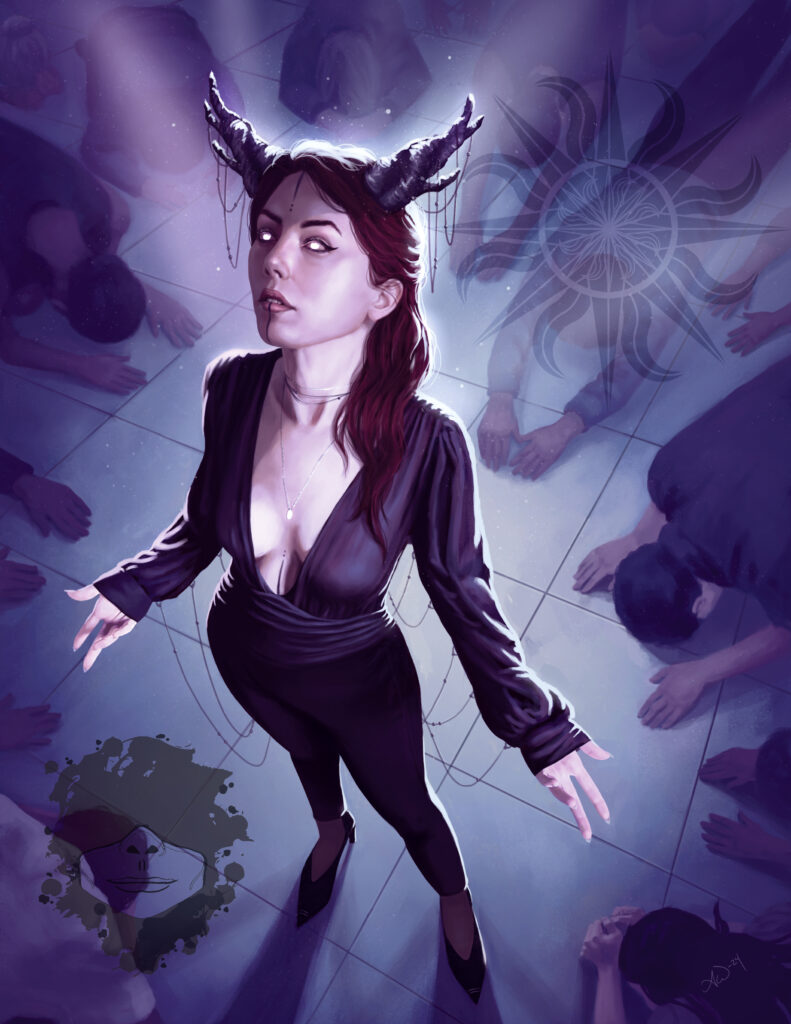
The Outcasts are the descendants of a spirit (known as an “archon”) cast out from another world. It doesn’t matter if they were an angel, a demon, a minor god, or a horror from beyond — something did something wrong and was banished to our world as a result. And the Outcasts are the inheritors of that inhuman legacy, and that curse.
Outcasts conceal their true selves from the people and places they frequently encounter, allowing them to approximate human lives. Theirs are existences of concealment and torment, as they attempt to claim power over their identities and destinies.
Cassie, one of our signature characters for Curseborne, explains it like this:
We’re good at lying to ourselves, but as a result we’re also good at lying to everyone else. We put on a pretty face and a charming smile, using kind words or rousing rhetoric to convince everyone else that we’re good people, someone you can rely on, or at least someone you can lend a buck to. But those other people — our friends, our marks, whatever you want to call them — they aren’t the ones that see us at our lowest points. They don’t stare in the mirror and see the horns, the wings, the glowing skin, or the ghostly eyes floating around our heads. In the smallest hours, the ones where we can’t lie to ourselves, pretending to have so-called “human” relationships seems like a waste of time, because we clearly aren’t from around here.
Of course, most of us start off thinking we’re human. It’s only later you find out that someone in your family was cast out from another place, another somewhere. We call this somewhere the Outside, adding to the irony of our existence — we have been abandoned by everything that isn’t here, and most of the time we don’t even know which part of the Outside we’ve been banished from. Worse, it’s a generational sentence. Somewhere in the dim mists of supernatural history, a great-great-great-great-grandparent got kicked out of the Silver City or the Glowing Abyss for loving a human too hard, or providing succor to a secret enemy, or any of a thousand other reasons.
How do Outcasts know that we’re related to the mysterious entities of the Outside? Some families of Outcasts keep detailed ancestral records, but more out of a desire to prove how much better their connections are than from any real interest in cursed genealogy. Others have a charismatic leader who, upon receiving a vision from the Outside, imparted the good news of divine descent to their family. Still others, through a network of blogs and podcasts and message boards that would make a hardened conspiracy theorist blush, create and maintain a digital mythos around their Outsider ancestors.
What links us is our burning certainty of the Outside’s imprint upon us, an obsession with the higher realms and how that makes us so special. The others, though, don’t like to be reminded that we’re not as mortal as they are. Even the dead or half-dead or almost-dead or whatever still know just how fragile life can be, but we’re made of starstuff and divine grace. It can sometimes be just a little bit too much for them.
As a result, an Outcast perpetually tries to fit in, constantly aware of the impact they tend to have on the people around them. Being ingratiating is a survival mechanism, and people are naturally drawn to Outcasts… until they learn more about them.
What can the Outcast do?
Should they choose, the Outcast can let a portion of their alien nature slip through, helping them with social interactions (what they call “slipping off the mask”). An Outcast can also enter a slice of the Outside (often known as a “Battleground”) — to escape the real world, to fight archons and other inhuman entities, or to gain secret knowledge. Depending on their personal power, this can be done obviously or subtly. With a ritual, they can even bring others with them. But the Outcast needs to know the Battleground they’re going to, which means they have to explore to expand their access to the Outside. And exploring is dangerous.
That said, as much as they might want to be, Outcasts aren’t completely human. Most of the time that’s fine, since they’re so good at getting people to like them, but occasionally things go sideways. Occasionally, everyone in the nearby area gets a momentary glimpse into what the Outcast truly is: an inhuman creature from another plane of existence. The memory quickly fades, but it has a lingering impact on their subconscious minds with damages their relationship with the Outcast.
To overcome this impact, the Outcast must reconnect with humanity. This usually takes the form of some kind of mundane act, such as giving an acquaintance advice about love, or helping their favorite barista to get a raise from her manager. As long as it’s something that causes the Outcast to remember the little things, a reminder of why humans are precious and valuable, the act can help them reassert their humanity… until the next time.
Every Outcast also has access to three Practices:
- The Practice of Dynamism grants the practitioner the power over violence and death. They become a live wire, cutting their way across the battlefield. Those descended from the archons find that they resonate most strongly with this art.
- The Practice of Manifestations summons weapons and armor from the character’s innate power. At greater levels it allows the Outcast to transform herself into the archon sleeping within her.
- The Practice of Physical Perfection frees the Outcast from having to obey silly things like the laws of physics.
I should play an Outcast if I want to…
… turn into a badass angel or demon that can melt the minds of everyone around me.
… rebel against inhuman entities, some of which I may be related to.
… explore strange and terrifying realms of reality.
… struggle to feel human when everything inside says I’m not.
… balance cosmic truths and mundane realities.
… lie to myself and to others.
… fight for my friends, even if I scare them on a deep, fundamental level.
… learn to survive in a world that wants to reject me.
… have a secret life that other people could only dream about.

Cassandra Billings
Cassie is one of our signature characters for Curseborne, and specifically, the Nephilim who narrates much of the Outcast chapter in the book. She always knew she wanted to go into law school to help people. Even though working in civil liberties was guaranteed to ensure she wouldn’t be able to pay off her school loans, she knew she couldn’t just stand by and watch injustice happen. Her family encouraged her, hoping to channel her scholarly tendencies into something that can be used to fight against a corrupt system.
So, when they told her she was part of a bloodline of Nephilim devoted to studying the ancient horrors from beyond, she wasn’t all that surprised. It explained a lot, actually. Sure, she had to start going to the gym more and learn how to fight with more than just her words, but a lot of things in her life made sense after that.
A shame that didn’t last. Here’s the story in Cassie’s own words.
Yeah, yeah, get the “demon lawyer” jokes out of your system now. Every day I go into the office I deal with a parade of liars, and it takes one to know one. Because you and I? We both lie to ourselves. Outcasts pull their delusions from the wealth of mythologies available to us, but at best, we’re trying to define a world based not on hard research, but wishes and desires.
We want to believe in cities of gold and silver, exotic miracles birthed from impossible pyramids, and sensation beyond all human understanding, but in the end, all we have is what’s happening right here, right now. We can daydream about the rivers of the Underworld all we like, but that’s what they are: dreams. And it hurts because, deep down, we know we came from somewhere else. Discovering ourselves and taming our intense power is an infinitely deep rabbit hole you can’t stop yourself from diving down, and it’s easier to lie than to face the truth.
Imagine that no matter where you go, what you do, who you’re with, everyone is watching you. They don’t look like they are, but every person near you is judging you, waiting for you to make a mistake. Everyone is judging you to see if you’re human enough for them, and it’s tempting to run from all that attention. Plenty of us reach that point where we wish we didn’t have that constant eye, or eyes, upon us.
That moment passes. Don’t worry. You’ll get used to it. You have no choice.
Many of us gravitate towards roles where being too much is just part of the daily grind: politicians, performers, fixers, and yes, even lawyers. If everyone’s going to stare at you, give them something to stare at, right?
Cassie finds she feels more human when she’s helping others, such as the rest of her crew of Accursed (including getting Izzy out of her inevitable violent conflicts with anyone who disagrees with her). But she also knows that many people lie to themselves and to others, so she ends up being selective in who she trusts and gives her support to. Sometimes she ends up paranoid about everyone around her, which causes her to spiral into isolation, and she forces herself to perform some random act of radical kindness to break out. And thus does the cycle continue.
The Nephilim
Cassanda’s family is known as the Nephilim. They are a family of travelers and scholars, who document and preserve as much information as they can — not only about themselves, but about grudges, marriages, affairs, and the myriad of ways the Accursed can bump up against each other. As a result, they consider familial ties and the preservation of secrets to be very important to their overall survival.
The Nephilim, then, are the archetypal secretive family that extends its tendrils into many walks of life while keeping its personal secrets locked up tight. Even when family members squabble amongst each other, they present a united front when threatened. However, this insularity comes with a cost. They pass their magical or mundane knowledge only to their children or other blood relatives, and rarely to those who are married into or adopted by the family. They would rather travel the entire world looking for lost blood relatives than trust a so-called “outsider” to their family.
Those Outcasts who identify most strongly with their family gain an Inheritance for it, because the Nephilim know of secret mystical shortcuts between places. Once in a while they can quickly and quietly duck into and out of a nearby Battleground, appearing in a location in the real world they personally know about moments later.
Play a Nephilim if you want to…
… gather and preserve knowledge, as well as trading some of it to others.
… explore the Battlegrounds and the Outside, forever seeking an edge on your rivals.
… engage with complicated family intrigue and the morality of preserving or revealing secrets.


Really excited for the Outsiders/Outcasts! So it seems a lot of their mechanics are focused around their true forms, as well their connections with people.